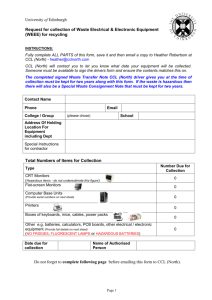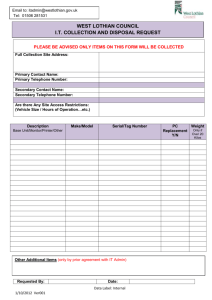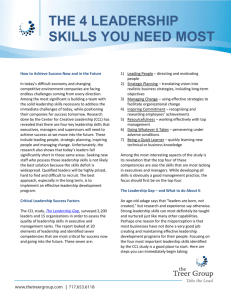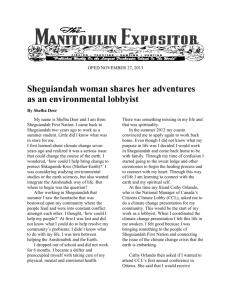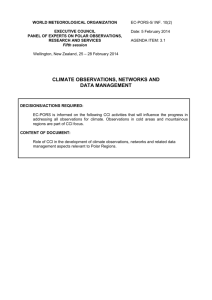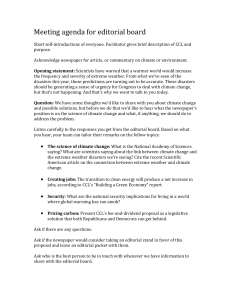Speaker Biographies - Citizens' Climate Lobby
advertisement
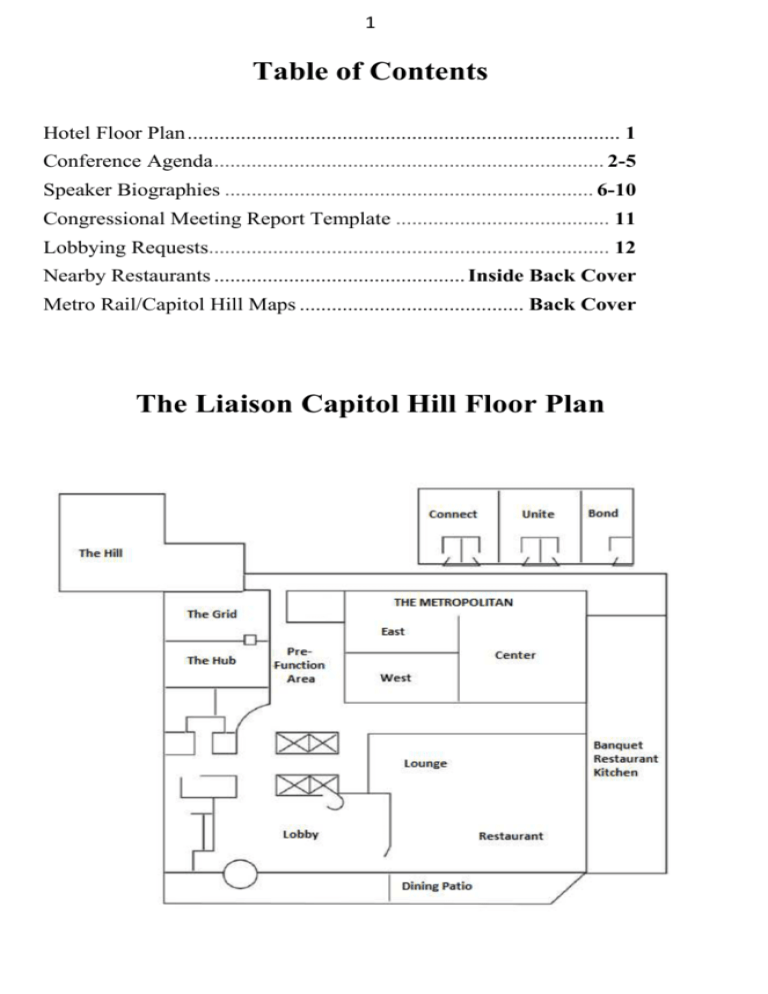
1 Table of Contents Hotel Floor Plan ................................................................................. 1 Conference Agenda ......................................................................... 2-5 Speaker Biographies ..................................................................... 6-10 Congressional Meeting Report Template ........................................ 11 Lobbying Requests........................................................................... 12 Nearby Restaurants ............................................... Inside Back Cover Metro Rail/Capitol Hill Maps .......................................... Back Cover The Liaison Capitol Hill Floor Plan 2 Sunday, June 23 9:00-6:00 Registration- Pre-Function Area (AM Coffee & Tea) 9:30-12:30 Group Leader Meeting (Existing Group Leaders) Metropolitan 12:30-2:00 CCL Group Leader Lunch Hub/Grid/Hill 2:00-5:00 Group Start Workshop: This session is for CCL members Metropolitan who have not attended a group start workshop or for new members who are starting CCL chapters in their communities. It covers the basics of CCL, how we got started, the CCL approach & methodology, and advocacy tools that we use. 2:30-5:00 Lower Senate Park 5:00-6:00 6:30-8:30 Metropolitan 8:45-9:45 Rooftop Pool Cool Planet Frisbee Play Head South on New Jersey Ave, left onto D St NW, .2 miles, destination will be on your right. Dinner (On Your Own) Conference Begins: After welcoming remarks, this session will be devoted to learning and practicing the speaking points we will use in our meetings on Capitol Hill. Welcome Reception: Hosted beer/wine/soda bar & hors d’oeuvres. Monday, June 24 8:30-6:00 9:00-9:30 Metropolitan 9:30-10:45 Metropolitan Registration- Pre-Function Area (AM Coffee & Tea) Opening Remarks Keynote: “Itinerant Farming to White House Arrests: A Scientist's View of the Climate Crisis”-Dr. James Hansen: Former NASA head climate scientist tells the story of his personal journey from a scientist who was content to do the research and eschew the spotlight to a concerned citizen who felt compelled to speak up about policy to address the threat of catastrophic climate change. 10:45-11:00 Break 11:00-12:15 Plenary:“The Case for a Carbon Tax”-Dr. Shi-Ling Hsu: Metropolitan Why a gradually-rising carbon tax is the least costly and most effective policy for curbing the pollution driving global warming, and how enacting such a tax can usher in a new era of clean energy and efficiency. 3 Monday, June 24 Continued 12:30-2:00 Lunch (On Your Own) 12:30-2:00 Major Donor Luncheon (By Invitation) Unite 2:00-3:00 Breakout Sessions: Metropolitan “Building the Green Economy”-Joe Robertson: Center There’s a myth that we have to choose between ecology and economy, that taking steps to protect the environment and stop climate change will exact an economic toll. Robertson explodes that myth and explains how policies to address climate change will produce jobs and grow our economy. Hub/Grid “Can We Power the World Without Fossil Fuels?” -Dr. Danny Richter: The discussion about clean energy often gets bogged down with doubts about our ability to meet energy needs. Can it be done? According to an extensive study out of Stanford University, the answer is yes, and Danny Richter explains how it can be done. Hill “Listening Skills for Activists”-Madeleine Para: A good listener gains people’s trust, learns what people need to hear in order to change, and brings people closer together – just what we need to do with both our members of Congress and our fellow activists. Brush up your listening skills and practice them in this workshop. Metropolitan “Getting Op-eds Published”-Steve Valk: West If you’re an old pro at getting letters to the editor published in your newspaper, maybe it’s time to take your media work to the next level and start publishing op-eds. This workshop will look at different approaches to writing op-eds and tips that will improve your chances of getting published. “Putting the FUN into FUNdraising”-Lynate Pettengill: Metropolitan When you think of fundraising, does it sound like fun? Or do East you think to yourself, “I’d rather poke a sharp object into my eye”? This breakout session will take the fear and dread out of raising money to fund our vision for a livable world, whether it’s to send local activists to Washington or to grow our national organizations. 3:00-3:15 Break 4 Monday, June 24 Continued 3:15-4:00 Breakout Sessions: Metropolitan “Getting the Most Out of Social Media”-Steve Valk, Erica Center Flock & Cathy Orlando: Twitter and Facebook and Pinterest… Oh my! We all know it’s important to use social media, but unless you have a strategy, you’re spinning your wheels. This session will help you develop a game plan to effectively use online tools to organize your group, attract new members, and get your message out. Metropolitan “Building Relationships with Editorial Boards and West Congressional Offices”-Elli Sparks: Want your town's newspaper to speak out for a consumerfriendly carbon tax? Looking for a breakthrough with your conservative member of Congress? It all turns on relationship. In this session we’ll share the tools and techniques that CCL groups have used to build those relationships. Metropolitan “Peer Support for Climate Activists”-Dr. Jim Driscoll: East Global warming can scare, anger, and/or discourage us, causing burnout, too urgent communications and other ineffective activism. This workshop will teach participants the tools of peer support to help deal with these feelings in order to become more effective activists. Hub/Grid “What the Heck is Pigouvian Taxation?”-Jerry Hinkle & (till 4:15) Sieren Ernst: Want to bring conservatives around on a carbon tax? You need to talk about Pigouvian taxation, the concept of correcting distortions in the marketplace by taxing things that are unaccountable for their true cost to society. Become persuasive by mastering this talking point. Hill “Why the RESULTS/CCL Model Works”-Sam Daley(till 4:15) Harris: Something remarkable is going on in CCL. You and your colleagues are stepping into the action and altering the conversation around climate. Learn why this model works and what we must protect in the model to have the ultimate breakthrough we are committed to. 4:15-4:30 Break 5 Monday, June 24 Continued 4:30-5:30 Breakout Sessions: Metropolitan “Effective Meetings on the Hill”-Emily Enderle and Scott Stephanou: Whether you’re meeting with a member of Congress or their staff, there are things you should do – and things you shouldn’t do – to ensure having a successful and productive outcome. Staffers from Capitol Hill will offer their tips and answer your questions. Hill “O, Canada!”-Cathy Orlando: What lies ahead for CCL Canada? This session is for Canadians to come hear the vision for growing CCL and the strategic plan to have Ottawa enact a revenue-neutral carbon tax. Hub/Grid “The Health Related Impacts of Burning Fossil Fuels”Joel Charles: Presenting climate change from a human health angle is one of the most effective messages to spur people to action. Participants will become literate in the threat climate change poses to human health, the current health impacts of fossil fuel use, and the significant, immediate health opportunity available if we act now on climate change. Unite Regional Coordinators Meeting – Mark Reynolds: Strategic meeting for CCL’s regional coordinators. 5:30-7:00 Dinner (On Your Own) 7:00-10:00 CCL Celebration- Come kick up your heels with fellow CCL Metropolitan Partners. Tuesday, June 25 8:15 am 9:00-5:00 RHOB Cafeteria Photo on Capitol Hill – Location TBA Congressional and World Bank Lobbying: Between meetings, CCL staff and volunteers will get together in the rear of the Rayburn cafeteria to share stories and encouragement. 7:00-9:00 Lobby Day Reception: Join all our volunteers, special guests, Metropolitan and members of Congress to celebrate your accomplishments. Refreshments will be served. Wednesday-Friday: Additional Lobbying 6 “Creating a Climate for Change” Speaker Biographies Joel Charles Joel is a Wisconsin medical student who recently completed his Masters of Public Health, focusing on the health impacts of climate change. He is currently finishing his medical degree with the intention to practice family medicine while advocating for climate policy. He is helping build a network to provide physicians with efficient, effective ways to make health a central piece of conversation in climate change. He is also organizing an effort to help climate activists become literate in the health impacts of climate change. He was awarded the Jack Kent Cooke Graduate Scholarship in 2009 to pursue his M.D. and Master’s Degree at the University of Wisconsin School of Medicine and Public Health. Sam Daley-Harris Sam is the CEO and founder of the Center for Citizen Empowerment and Transformation, which seeks to bring strategies to organizations so that a segment of their membership can create champions in Congress and the media for their causes. In 1980, he founded RESULTS, a citizen lobby working to end hunger and poverty that later became the model for CCL. In 1997 he organized the first Microcredit Summit and managed the Microcredit Summit Campaign. The Summit’s goal of reaching 100 million of the world’s poorest families with micro-lending services was surpassed in 2007. This fall, he will release the 20th Anniversary edition of Reclaiming Our Democracy: Healing the Break Between People and Government, which includes a new chapter about Citizens Climate Lobby. Dr. Jim Driscoll Dr. Driscoll earned his BA and MBA from Harvard (along with All-East honors in football), his Ph.D. from Cornell in Organizational Behavior, and has taught at MIT’s Sloan School of Management. As a decorated combat veteran of Vietnam, he quit his job as a college professor in 1982 to work full-time in a variety of social change movements for the next 22 years. He has helped found and lead a number of successful state and national organizations including Peace Action and US Action. In 2004, he launched NIPS, which seeks to make the tools of peer support broadly available to those seeking to make this a better world. For the last two years, he has focused exclusively on climate change, including co-founding the CCL chapter in Tucson, AZ, and is currently helping expand the chapter in DC (where he and his wife recently moved to help raise new twin grand-daughters!). 7 “Creating a Climate for Change” Speaker Biographies Emily Enderle Emily currently serves as an environmental policy advisor for U.S. Senator Sheldon Whitehouse (D-RI). She holds a Master of Environmental Management from the Yale School of Forestry & Environmental Studies and a B.A. in Environmental Studies from Oberlin College. Sieren Ernst Sieren has over a decade of experience in development and environmental markets in the United States, Europe, and Asia. She has worked for diverse organizations from the UNDP-GEF to global carbon funds. Her clients have included innovative start-ups, civil-society organizations, and commercial investment funds. Sieren is a graduate of Northwestern University with degrees in economics and history. Erica Flock Erica manages social media and other communications for the nonprofit EarthShare, a federation of over 500 national and local environmental groups. She's also provided marketing support to the National Wildlife Federation, Rachel's Network, and Citizens Climate Lobby. She recently started a consultancy, Negwegon Communications that works to tell compelling stories for the environmental community. Dr. James Hansen Dr. Hansen, perhaps best known for bringing global warming to the world’s attention in the 1980s when he first testified before Congress, is an adjunct professor at the Department of Earth and Environmental Sciences at Columbia University and at Columbia’s Earth Institute and the former director of the NASA Goddard Institute for Space Studies. He has appeared on 60 Minutes, ABC News Tonight, Anderson Cooper, and Charlie Rose; has been interviewed in the New York Times and profiled in the New Yorker; and has written for the Boston Globe, the Nation, the New York Review of Books, and Scientific American. He is the author of Storms of My Grandchildren. 8 “Creating a Climate for Change” Speaker Biographies Jerry Hinkle Jerry is ABD in Economics, has a Masters Degree in Climate Policy, and has several publications in finance and in the economics of climate policy. He taught economics and finance for seven years. He is committed to a transformation in mankind’s relationship to environmental stewardship, such that we live sustainably. He has given public presentations for 12 years and lobbied Congress for seven to forward market-based solutions to climate policy. Professionally, he has worked as an economist in bank risk management for the last 30 years. He has served as a Team Leader for CCL for 2 years and currently serves as the Northern California Regional Coordinator. Dr. Shi-Ling Hsu Dr. Hsu is a Professor of Law at the Florida State University College of Law. Prior to his current appointment, Professor Hsu was a Professor of Law and Associate Dean for Special Projects at the University Of British Columbia Faculty Of Law. He has also served as Deputy City Attorney for the City and County of San Francisco. Dr. Hsu has a B.S. in Electrical Engineering from Columbia University, and a J.D. from Columbia Law School, M.S. in Ecology and a Ph.D. in Agricultural and Resource Economics, both from the University of California, Davis. He has taught in the areas of environmental and natural resource law, law and economics, quantitative methods, and property. He is the author of The Case for a Carbon Tax: Getting Past Our Hang-ups to Effective Climate Policy. Dr. Danny Richter Dr. Richter is Legislative Director for Citizens Climate lobby. He earned his doctorate in Oceanography at the Scripps Institution of Oceanography at the University of California, San Diego, in 2013. His research is focused on iron, zinc, cadmium, copper, aluminum, and phosphorus incorporation into marine diatoms, a class of phytoplankton responsible for producing 40% of photosynthesis in the ocean. His studies have taken him to all 7 continents. Danny received his B.S. in Environmental Geoscience from the University of Notre Dame, and his M.S. in Earth Science from UC San Diego. 9 “Creating a Climate for Change” Speaker Biographies Cathy Orlando Cathy, National Manager for CCL Canada, is a mother of three girls ages 6, 16 and 17, partner of Sanjiv Mathur for 27 years, published scientist, educational author, and regular contributor to both of her local newspapers (The Sudbury Star and Northern Life). She was formerly the Science Outreach Coordinator for the Faculty of Science and Engineering at Laurentian University. A national environmental award was named for her by Let's Talk Science to honor her work for environmental protection and science communication. Cathy was also nominated for a CBC Champion of Change award in 2010 and received a Queen Elizabeth II Diamond Jubilee Medal in 2012. Madeleine Para Madeleine Para, CCL's Program Director, has helped start 8 CCL chapters in her home state of Wisconsin and is the group leader for the Madison chapter. Prior to joining the staff of CCL, she worked as a pre-school and first grade teacher, which she insists is excellent training for organizing adults. In addition, she has taught listening and co-counseling skills to people from all backgrounds for over 30 years. She lives with her husband and fellow CCL teammate Glen Ecklund and her 22-year-old son Ethan in a co-housing community in Madison. Lynate Pettengill Lynate, CCL’s Director of Field Development, started the Lawrence, Kansas, CCL group in 2011 and joined our staff in the spring of 2013. Before coming to CCL, she worked as a major donor fundraiser for 20 years for various nonprofits, including The Nature Conservancy and Sierra Club. Lynate brings an infectious enthusiasm to CCL, and she’s determined to infuse FUN into all aspects of our work, INCLUDING fundraising! Lynate resides in Lawrence, KS with her 18-year-old son, Ethan, and her Labrador, Ringo. 10 “Creating a Climate for Change” Speaker Biographies Joseph Robertson Joseph is the creator and director of the HotSpring Network. He is editor-in-chief of the science, technology and economics-focused periodical, the HotSpring Quarterly. He is the author of the 2010 report Building a Green Economy: On the Economics of Carbon Pricing & the Transition to Clean, Renewable Fuels. He was Citizens Climate Lobby’s first group leader on the east coast, and now volunteers as tri-state coordinator for New York, New Jersey, and Pennsylvania. Since 2009, Joseph has been involved in Villanova University's vibrant sustainability community. He is one of the faculty members working to establish the proposed Augustinian Center for a Just, Sustainable & Resilient World. Elli Sparks Elli, CCL’s Development Director, started CCL Richmond and pioneered several CCL techniques including relationship building with staff of conservative members of Congress and editorial page editors of conservative newspapers. She runs a small family farm with her husband and children in south central Virginia. Their farm employs holistic management practices to enhance the carbon sucking capacities of the land and feed her family. Elli has worked in non-profit management for twenty years, specializing in fundraising. Currently, she is working with interns from a nearby university to establish a group in her new congressional district. Scott Stephanou Scott earned a B.A. in Political Science from Quinnipiac University in Hamden, CT. Prior to joining the staff of U.S. Congressman John Larson, he worked for a number of political campaigns such as Senator Evan Bayh's Political Action Committee, Senator Christopher Dodd's presidential campaign, and as field director for the campaign of U.S. Congressman Jim Himes. Since 2009, he has worked for Congressman Larson as a legislative assistant, advising him on issues such as energy, environment, transportation, Social Security, telecommunications, and government oversight. Steve Valk Steve is Communications Director and Regional Manager for CCL. He trains and supports volunteers to get published in their local newspapers and to develop relationships with their members of Congress. He joined the CCL staff in 2009 after a 30-year career with the Atlanta JournalConstitution. He has worked as a media consultant for RESULTS. Steve blogs for Citizens Climate Lobby on Huffington Post and his writings on climate change have appeared in newspapers throughout the US. 11 Congressional Meeting Report Template Member of Congress Name: (Last Name, First Name) State/District: (i.e. MA SR, MA JR, MA01, MA02) Date/Time: (Month, Day, Year, Time) Location: (DC Office) CCL Meeting Leader: (Last Name, First Name) Minute Taker: (Last Name, First Name) Congress Member and Staff Present: (Last Name, First Name) Was this a “Face to Face” meeting with Congress member? Yes No Delivery of materials only? Citizens Climate Lobby members present: (Last Name, First Name) Main Discussion Points: Include Congress members’ concerns, questions, comments **** Who does the Congress Member work with across the aisle?**** Handouts given at meeting: Duration of meeting: Follow- up assignment & dates: Information to send? Action steps to build support? Next meeting? After the meeting: Specifics to mention in a thank you note to the Congress person or staff? CCL meeting leader: Take the report today to CCL staff for photo-scanning the day of your meeting. amy.bennett@citizensclimatelobby.org 12 Hill Requests Introduce or support a bill for a steadily-rising fee/tax on carbon-based fuels that returns all revenue to households. With the concentration of carbon dioxide in the atmosphere reaching 400 parts per million this year – a level not seen since long before humans existed and sea levels were 60 feet higher – it becomes clear that steps must be taken to reduce greenhouse gas emissions. The largest market failure in the history of humanity is the under-pricing of fossil fuels. This costs American jobs, since wind, solar, and biomass generate 2.5 - 9.25 times as many jobs as coal, oil, and gas for every $1 million contribution to GDP. Citizens Climate Lobby believes the best solution – one that can find common ground with both Republicans and Democrats – is a revenue-neutral carbon tax that returns proceeds to households. Such legislation should: Tax carbon-based fuels upstream, at the first point of sale. Increase the tax at a pace that motivates the emissions reductions necessary to avoid catastrophic consequences. Protect low- and middle-income households from increased energy costs associated with the carbon tax. Protect American businesses with border adjustment tariffs that also encourage other nations to adopt equivalent carbon pricing. HOUSE REQUEST There are several options to support such legislation. Which of the following would be appropriate for your office? Republicans can meet to draft their own revenue-neutral carbon fee/tax bill. Talk to members of Congress who are developing carbon fee/tax bills -- Rep. John Larson or Rep. Henry Waxman/Earl Blumenauer. For all House members, insist that any bill be 100% revenue neutral, and that the tax reaches at least $100 per ton of CO2 within 10 years. SENATE REQUEST There are several options to support such legislation. Which of the following would be appropriate for your office? Talk to Sen. Whitehouse or Sen. Schatz about the bill they are drafting and consider sponsoring. Talk to Sen. Boxer or Sen. Sanders about co-sponsoring the Climate Protection Act (S.332). Republicans can meet to draft their own carbon tax bill. For all senators, insist that any bill be 100% revenue neutral, and that the tax reaches at least $100 per ton of CO2 within 10 years.
